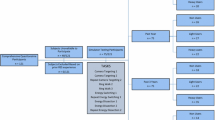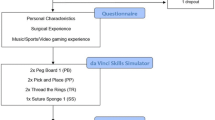Abstract
We aimed to investigate the effects of video game habits, duration of experience, and training in different surgical clinics on the success of robotic surgery simulators. In this prospective, observational, comparative, and multi-clinical study, all participants played Temple Run and Piano Tiles 2™ mobile games for 1 month, after answering a questionnaire including their sociodemographic characteristics, surgical experience, and past and current video game experience. At the end of the period, participants experienced four different robotic surgery simulator tasks (Camera Targeting 1, Energy Switching 1, Ring and Rail 2, Vertical Defect Suturing) in da Vinci® Skills Simulator™. Additionally, sociodemographic data were statistically analyzed with mobile game scores and 13 different performance scores obtained from the simulator. All robotic surgery simulator skill applications were carried out at Ege University Hospital in Izmir. All surgical residents in the general surgery, urology, and pediatric surgery clinics were included in the study. Sixty of the sixty-four participants in total completed all the processes. Four participants were excluded from the study. When clinical performances were compared, it was seen that the general surgery clinic performed better than other clinics in two parameters (overall score, time to complete) of the 'Camera Targeting' task (p = 0.01 and p = 0.006). Participants with mobile phone games experience were successful in the 'Energy Switching' task with less misapplied energy time (p = 0.039). Participants with high scores in Piano Tiles 2™ were more successful in the 'Energy Switching' task and completed the 'Ring Rail' task with fewer movements (p < 0.05). Participants with more surgical and laparoscopic surgery experience scored higher in the ‘Camera Targeting’ and 'Energy Switching' tasks and completed the assignments with less movement. Again, these participants completed the 'Vertical Defect Suturing' task faster and the ‘Ring Rail’ task with less movement. In addition, participants with more laparoscopy experience scored higher in the 'Ring Rail' task (p < 0.05). In this study, we showed the effect of recent gaming experience on robotic surgery abilities along with previous video game experience. For surgeons and surgeon candidates in robotic surgery training, the importance of video game-based learning techniques will increase when combined with rapidly developing simulation technologies.
ClinicalTrials.gov Identifier: NCT05510960.
Similar content being viewed by others
Data availability
Not applicable.
References
Leal Ghezzi T, Campos CO (2016) 30 years of robotic surgery. World J Surg 40(10):2550–2557. https://doi.org/10.1007/s00268-016-3543-9
Gallagher AG, Leonard G, Traynor OJ (2009) Role and feasibility of psychomotor and dexterity testing in selection for surgical training. ANZ J Surg 79(3):108–113. https://doi.org/10.1111/j.1445-2197.2008.04824.x
Schlottmann F, Patti MG (2017) Novel simulator for robotic surgery. J Robot Surg 11(4):463–465. https://doi.org/10.1007/s11701-017-0746-5
Issenberg SB, McGaghie WC, Hart IR et al (1999) Simulation technology for health care professional skills training and assessment. JAMA 282(9):861–866. https://doi.org/10.1001/jama.282.9.861
Intuitive Surgical (2022) daVinci skills simulator. Available at: https://intuitivesurgical.com/products/skills_simulator/. Accessed 12 Feb 2022
Gupta A, Lawendy B, Goldenberg MG, Grober E, Lee JY, Perlis N (2021) Can video games enhance surgical skills acquisition for medical students? Syst Rev Surg 169(4):821–829. https://doi.org/10.1016/j.surg.2020.11.034
Rosser JC Jr, Lynch PJ, Cuddihy L, Gentile DA, Klonsky J, Merrell R (2007) The impact of video games on training surgeons in the 21st century. Arch Surg 142(2):181–186. https://doi.org/10.1001/archsurg.142.2.181
Sammut M, Sammut M, Andrejevic P (2017) The benefits of being a video gamer in laparoscopic surgery. Int J Surg 45:42–46. https://doi.org/10.1016/j.ijsu.2017.07.072
Moglia A, Ferrari V, Morelli L et al (2014) Distribution of innate ability for surgery amongst medical students assessed by an advanced virtual reality surgical simulator. Surg Endosc 28(6):1830–1837. https://doi.org/10.1007/s00464-013-3393-6
Harbin AC, Nadhan KS, Mooney JH et al (2017) Prior video game utilization is associated with improved performance on a robotic skills simulator. J Robot Surg 11(3):317–324. https://doi.org/10.1007/s11701-016-0657-x
Hvolbek AP, Nilsson PM, Sanguedolce F, Lund L (2019) A prospective study of the effect of video games on robotic surgery skills using the high-fidelity virtual reality RobotiX simulator. Adv Med Educ Pract 10:627–634. https://doi.org/10.2147/AMEP.S199323
Meier M, Horton K, John H (2016) Da Vinci© Skills Simulator™: is an early selection of talented console surgeons possible? J Robot Surg 10(4):289–296. https://doi.org/10.1007/s11701-016-0616-6
Shaw RD, Eid MA, Bleicher J et al (2021) Current barriers in robotic surgery training for general surgery residents [published online ahead of print, 2021 Nov 26]. J Surg Educ 79(606):614. https://doi.org/10.1016/j.jsurg.2021.11.005
Almarzouq A, Hu J, Noureldin YA et al (2020) Are basic robotic surgical skills transferable from the simulator to the operating room? A randomized, prospective, educational study. Can Urol Assoc J 14(12):416–422. https://doi.org/10.5489/cuaj.6460
Moglia A, Perrone V, Ferrari V et al (2017) Influence of videogames and musical instruments on performances at a simulator for robotic surgery. Minim Invasive Ther Allied Technol 26(3):129–134. https://doi.org/10.1080/13645706.2016.1267018
Harper JD, Kaiser S, Ebrahimi K et al (2007) Prior video game exposure does not enhance robotic surgical performance. J Endourol 21(10):1207–1210. https://doi.org/10.1089/end.2007.9905
Öge T, Borahay MA, Achjian T, Kılıç SG (2015) Impact of current video game playing on robotic simulation skills among medical students. J Turk Ger Gynecol Assoc 16(1):1–4. https://doi.org/10.5152/jtgga.2015.15188
Shee K, Ghali FM, Hyams ES (2017) Practice makes perfect: correlations between prior experience in high-level athletics and robotic surgical performance do not persist after task repetition. J Surg Educ 74(4):630–637. https://doi.org/10.1016/j.jsurg.2016.12.008
Davila DG, Helm MC, Frelich MJ, Gould JC, Goldblatt MI (2018) Robotic skills can be aided by laparoscopic training. Surg Endosc 32(6):2683–2688. https://doi.org/10.1007/s00464-017-5963-5
Yoo BE, Kim J, Cho JS et al (2015) Impact of laparoscopic experience on virtual robotic simulator dexterity. J Minim Access Surg 11(1):68–71. https://doi.org/10.4103/0972-9941.147696
Pimentel M, Cabral RD, Costa MM, Neto BS, Cavazzola LT (2018) Does previous laparoscopic experience influence basic robotic surgical skills? J Surg Educ 75(4):1075–1081. https://doi.org/10.1016/j.jsurg.2017.11.005
Mills JT, Hougen HY, Bitner D, Krupski TL, Schenkman NS (2017) Does robotic surgical simulator performance correlate with surgical skill? J Surg Educ 74(6):1052–1056. https://doi.org/10.1016/j.jsurg.2017.05.011
IJgosse WM, van Goor H, Luursema JM (2018) Saving robots improves laparoscopic performance: transfer of skills from a serious game to a virtual reality simulator. Surg Endosc 32(7):3192–3199. https://doi.org/10.1007/s00464-018-6036-0
Kulkarni S, Kulkarni Y, Bates-Powell J, Kulkarni MS, Sule M (2020) Evaluation of the console in acquiring laparoscopic skills through video gaming. J Minim Invasive Gynecol 27(4):875-882.e1. https://doi.org/10.1016/j.jmig.2019.07.028
Moglia A, Morelli L, Ferrari V, Ferrari M, Mosca F, Cuschieri A (2018) Distribution of innate psychomotor skills recognized as important for surgical specialization in unconditioned medical undergraduates. Surg Endosc 32(10):4087–4095. https://doi.org/10.1007/s00464-018-6146-8
Acknowledgements
We want to thank Cordamed Biomedical Engineering Company, Miss Duygu Esnafoğlu, Dr. Chantal B. Stutz, and our mentors for their support and inspiration.
Funding
The authors declare that no funds, grants, or other support were received during the preparation of this manuscript.
Author information
Authors and Affiliations
Contributions
All authors contributed to the study conception and design. Material preparation, data collection, and analysis were performed by ÖK, YT, AV, MÖ, HH, and ÖM. The first draft of the manuscript was written by ÖK and all authors commented on previous versions of the manuscript. All authors read and approved the final manuscript.
Corresponding author
Ethics declarations
Competing interests
The authors declare no competing interests.
Conflict of interest
The authors have no relevant financial or non-financial interests to disclose.
Additional information
Publisher's Note
Springer Nature remains neutral with regard to jurisdictional claims in published maps and institutional affiliations.
Rights and permissions
Springer Nature or its licensor (e.g. a society or other partner) holds exclusive rights to this article under a publishing agreement with the author(s) or other rightsholder(s); author self-archiving of the accepted manuscript version of this article is solely governed by the terms of such publishing agreement and applicable law.
About this article
Cite this article
Kılınçarslan, Ö., Türk, Y., Vargör, A. et al. Video gaming improves robotic surgery simulator success: a multi-clinic study on robotic skills. J Robotic Surg 17, 1435–1442 (2023). https://doi.org/10.1007/s11701-023-01540-y
Received:
Accepted:
Published:
Issue Date:
DOI: https://doi.org/10.1007/s11701-023-01540-y




